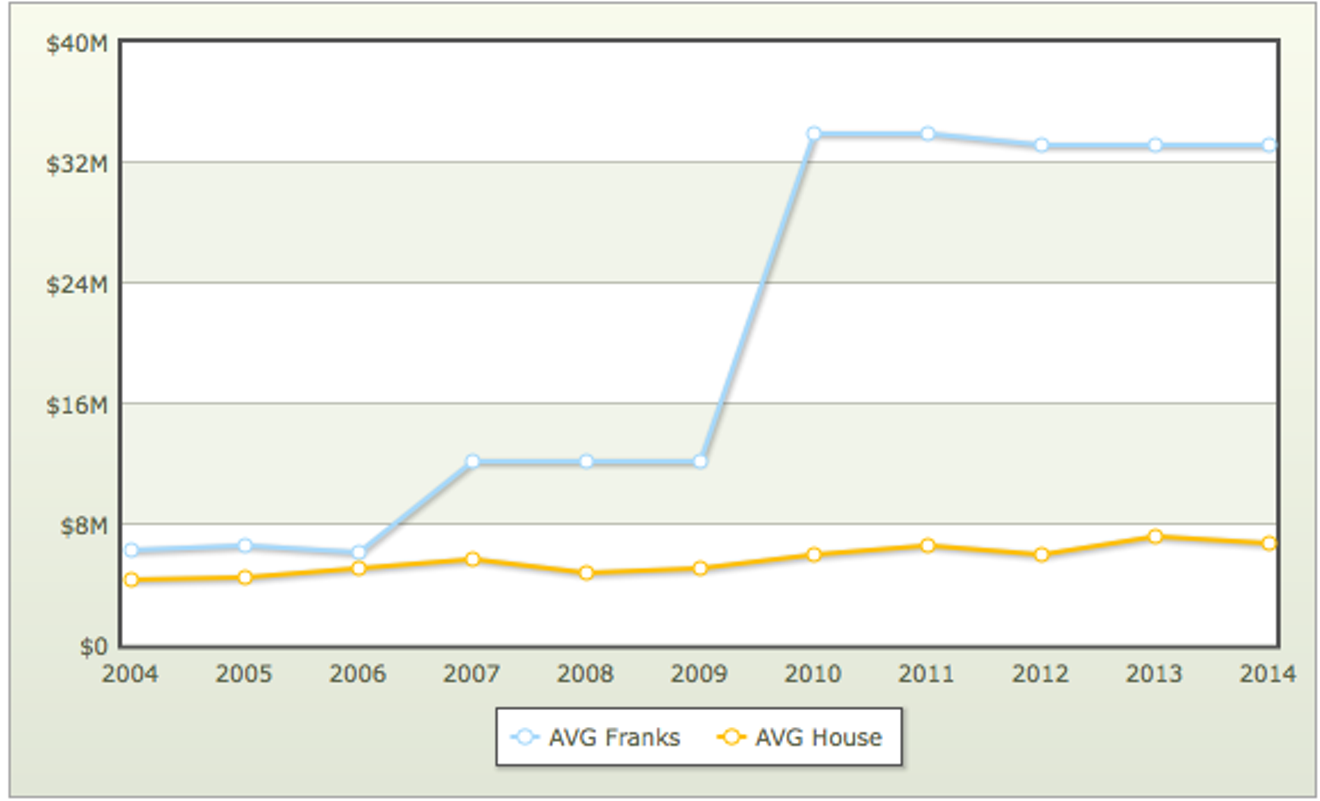The majority of lawmakers in Congress are millionaires. That's not entirely surprising when you consider that it costs more than $10 million, on average, to win a seat in the House. But it is concerning when you consider that these wealthy individuals recently voted to effectively take away health insurance from millions of people who won't be able to afford their premiums under the American Health Care Act.
And even within the elite club of wealthy politicians, Trent Franks, who represents Arizona's Congressional District 8, including Sun City and Surprise, stands out.
Take a look at the image above. That yellow line, the one that stays relatively flat, shows how much the net worth of the average member of the House increased between 2004 to 2014 — a time period in which many middle-class Americans saw their net worth plummet, thanks to the worst recession since the Great Depression.
The blue line that jumps waaaay up around 2009? That represents Trent Franks' net worth.
According to data analyzed by Ballotpedia, Franks' net worth has increased by $25,640,241 since he was first elected in 2003. During the time he's been in Congress, he's seen his net worth go up by 340 percent, averaging out to a 42 percent increase each year. During that same time period, the average American citizen saw their net worth decline by 0.94 percent.
Only two of Franks' colleagues saw their net worth increase more during that time period — Michael McCaul, a Republican from Texas, who's married to a Clear Channel Communications heiress, and Chellie Pingree, a Democrat from Maine who married a hedge fund manager during her second term in Congress.
So where does all Franks' money come from?
Members of Congress are compensated well — their base salary is $174,000, and they get other perks like excellent health insurance. But OpenSecrets.org calculated Franks' net worth at over $33 million in 2010, so he obviously has some other sources of income.
The most recent disclosure statement available, which dates to 2014, makes the real source of Frank's wealth clear: oil. His most lucrative assets are his shares in Trinity Petroleum, with a reported value in the range of $5 million to $25 million. According to Open Secrets, no other lawmaker is more heavily invested in the oil and gas industry.
Trinity Petroleum is something of a family business: The Arizona Corporation Commission lists Franks' brothers Lane and Travis as the company's directors.
It also shares an address with Liberty Petroleum, an oil-and-gas exploration company that Franks co-founded with his brother Lane in 1997. Trent Franks served as the company's CEO before running for office, but stepped down after being elected to Congress.
Arizona Corporation Commission records list Lane Franks as president and CEO of Liberty Petroleum, and Travis Franks as secretary and vice president.
Representatives for Franks could not be reached for comment on the relationship between Liberty Petroleum and Trinity Petroleum. They also did not respond to questions on how Franks' financial interests in the oil-and-gas industry had influenced his decisions on how to vote.
But his voting record speaks for itself: He voted in favor of opening the Arctic Ocean's outer continental shelf for oil drilling, supported a bill barring the Environmental Protection Agency from regulating greenhouse gases, and opposed a bill that would have created so-called "green jobs" through investment in the production of American-made biofuels.
Unsurprisingly, he also voted against removing subsidies for oil-and-gas exploration, and has repeatedly opposed tax incentives for the use of renewable energy.
He also received an "F" rating from the Sierra Club, thanks to an almost comically evil voting record on environmental issues that includes blocking efforts to clean up the Chesapeake Bay and voting against mining regulations intended to reduce instances of lung cancer.
Likewise, the League of Conservation Voters gives him a lifetime score of 4 percent — out of 100. (By comparison, his fellow Arizona congressman Raul Grijalva scores a 95 percent.) They cite the fact that Franks voted against providing disaster funding to Flint, Michigan, after the city's water supply was contaminated by toxic lead, among other things.
Franks' voting record has recently made him a target of Indivisible groups, who lobby for progressive causes and have taken to protesting outside his Glendale office. Though he ran virtually unopposed in 2016, after no Democrats stepped up to challenge him, it's looking like 2018 will be different — two Democrats, Brianna Westbrook and Judith McHale, and Republican Chris Sylvester are planning to run against him.
But given how much money Franks has to spend on a campaign, that's going to be an uphill battle.
[
{
"name": "Air - MediumRectangle - Inline Content - Mobile Display Size",
"component": "18478561",
"insertPoint": "2",
"requiredCountToDisplay": "2"
},{
"name": "Editor Picks",
"component": "16759093",
"insertPoint": "4",
"requiredCountToDisplay": "1"
},{
"name": "Inline Links",
"component": "17980324",
"insertPoint": "8th",
"startingPoint": 8,
"requiredCountToDisplay": "7",
"maxInsertions": 25
},{
"name": "Air - MediumRectangle - Combo - Inline Content",
"component": "16759092",
"insertPoint": "8th",
"startingPoint": 8,
"requiredCountToDisplay": "7",
"maxInsertions": 25
},{
"name": "Inline Links",
"component": "17980324",
"insertPoint": "8th",
"startingPoint": 12,
"requiredCountToDisplay": "11",
"maxInsertions": 24
},{
"name": "Air - Leaderboard Tower - Combo - Inline Content",
"component": "16759094",
"insertPoint": "8th",
"startingPoint": 12,
"requiredCountToDisplay": "11",
"maxInsertions": 24
}
]












